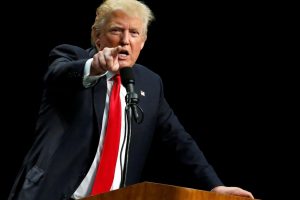by Leonard Chiang

Earlier this month, President Donald Trump bestowed “Fake News Awards” on an altogether predictable set of honorees. After all, the current occupant of the Oval Office has been trumpeting nominations in early-morning tweets all throughout the first year of his presidency. The Republican Party would have you know that the announcement remained a “highly-anticipated” event, especially after the reveal was delayed two days.
To be clear, combating fake news is an important task in concept, for the consequences of misinformation can be anything but trivial; history suggests political tensions can reach flashpoint with a dizzying quickness. In the years before the turn of the 20th century, an upstart United States asserted its place on the global stage with a rapid naval modernization. When under mysterious circumstances, the battleship Maine sank in Havana Harbor, the waters of an ailing Spanish Empire, the New York World and New York Journal, known for irresponsible and salacious reporting, raced to the bottom. Skipping the fact-finding, they accused Spanish agents of blowing up the vessel and, in the same breath, called for war. (For the record, experts concur today that the cause was likely an accidental detonation of onboard ammunition.)
The days of yellow journalism have long passed, but it should not be surprising that Trump feels under siege. The actions of his administration are studied with a granularity that verges on petty. Consider, for instance, how media outlets suddenly become anatomists when breaking down Trump’s tweets, or how CNN cameras sniffed almost audibly for any chyron-worthy bad news at the press conference on the president’s health.
However, Trump lacks the necessary moral high ground for his opinion on the issues to have real relevance. In regards to war, his potshots at Kim Jong Un have apparently done nothing to de-escalate tension, and the propensity of his White House to fabricate and/or exaggerate means (anti-)press releases are especially disingenuous. Indeed, as the work of provocateur Paul Horner showed, deliberately and obviously falsified news crept near the current center of power with alarming ease. Further, much to Team Trump’s chagrin, the American body politic does not seem to have responded to the Awards. The administration and its supporters were once again on their heels after the public heard the reporting of the disparaging comments Trump allegedly made about a swath of the developing world.
Hence, it is hard to imagine that Trump has much to offer by way of constructive criticism. If they are to wield the “fake news” label with any level of credibility, he and his associates need to tamp down the self-pity, develop more discerning eyes for themselves and stop forking fodder over to an unforgiving Fourth Estate.
Devoid of those developments, the awards are totally without value—just one of many temper tantrums of a touchy chief executive. Regardless, the awards might become a legitimate must-watch event next year.
Leonard Chiang, FCRH ’19, is an engineering physics major from Tolland, Connecticut.




































































































































































































